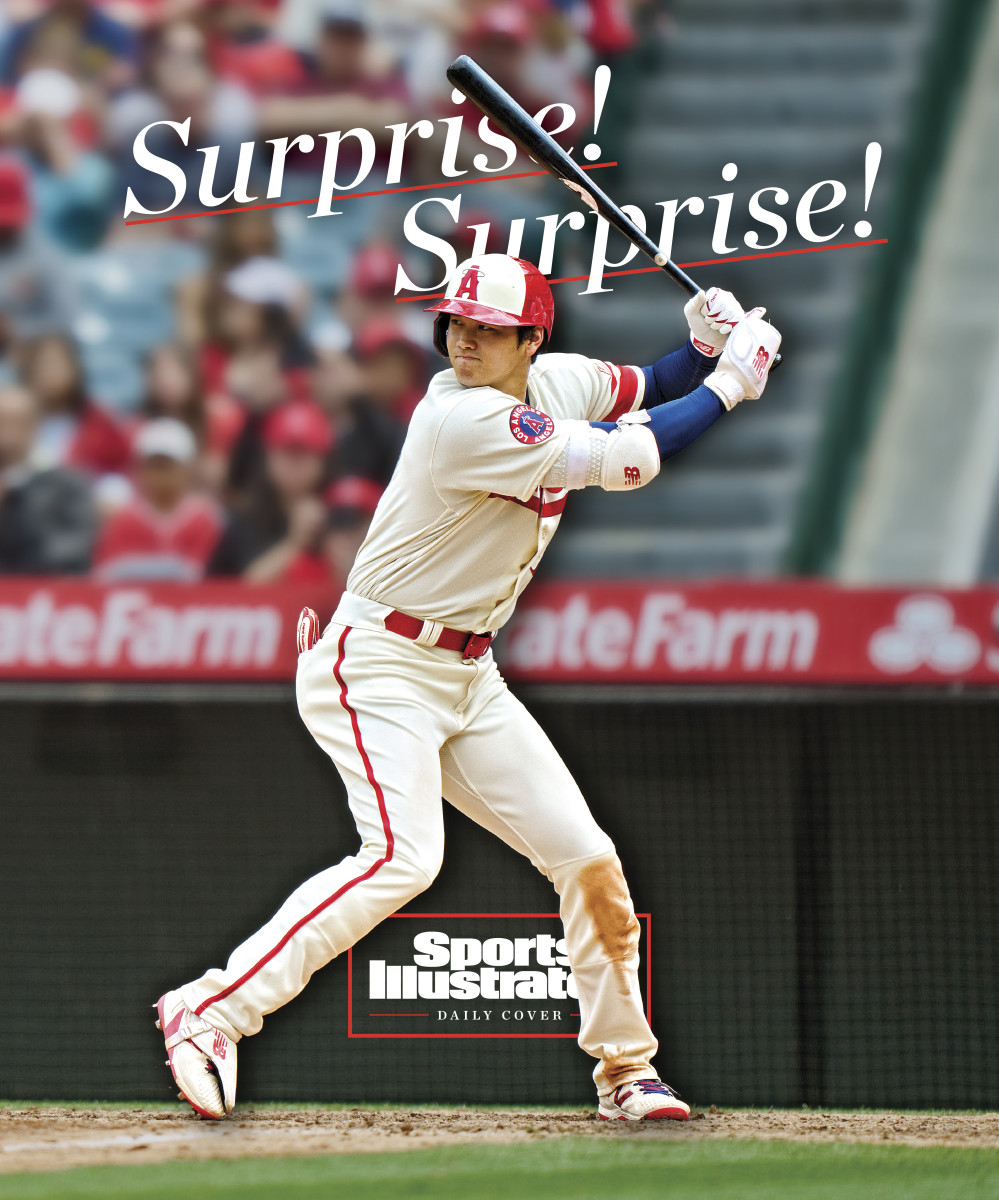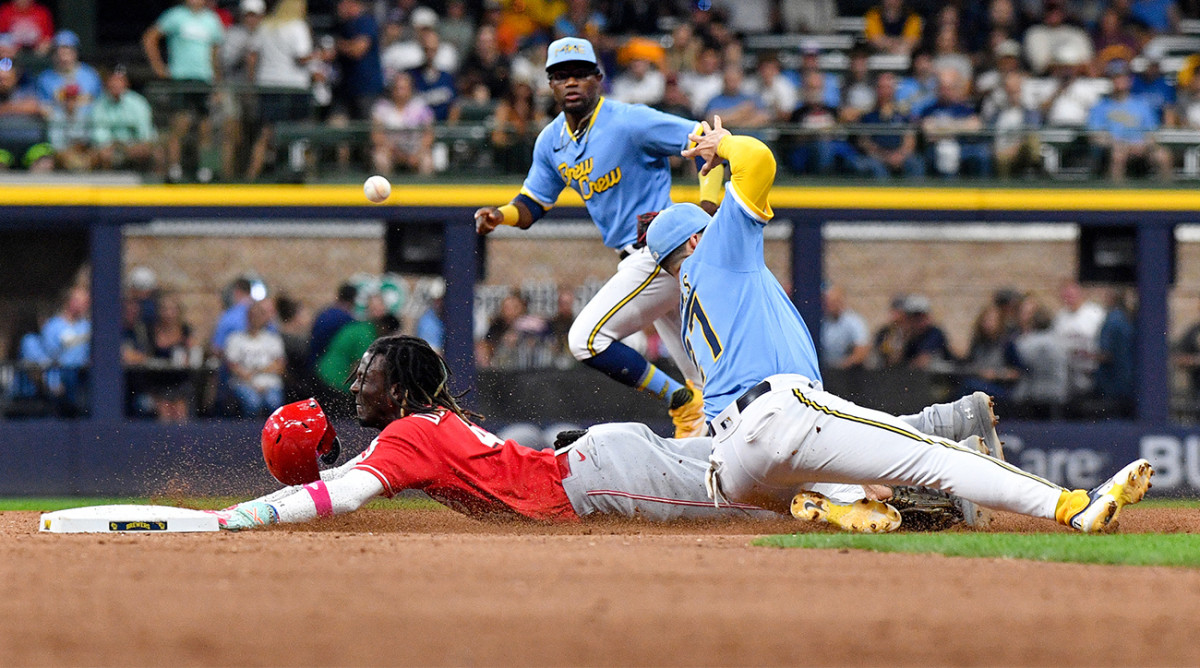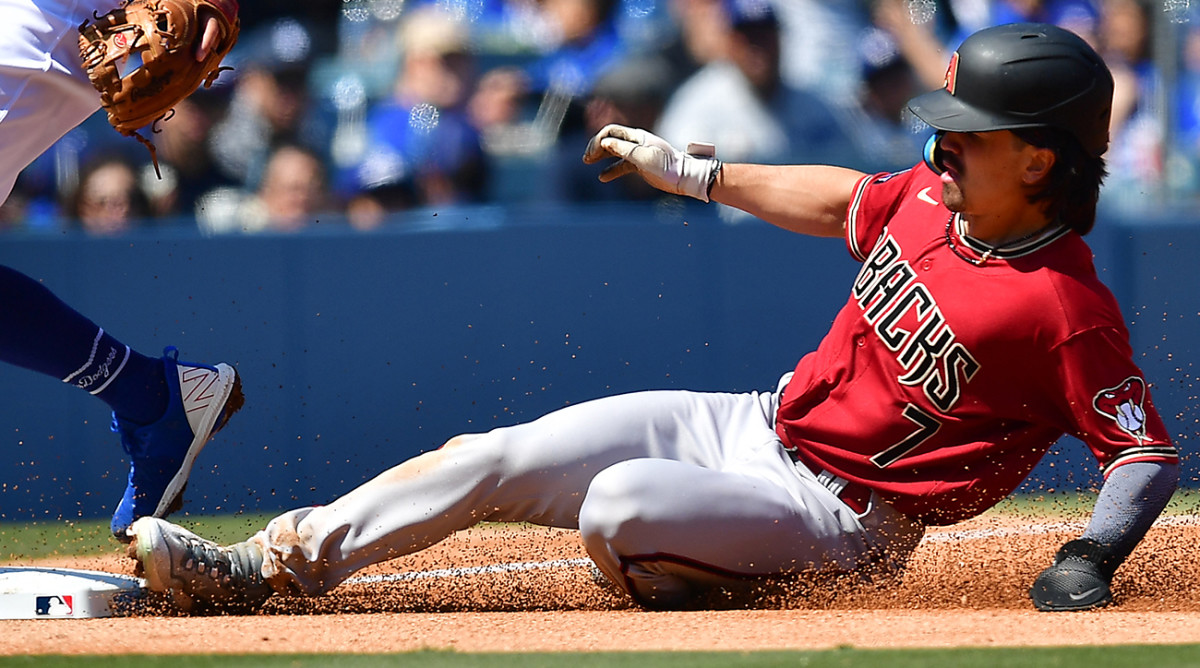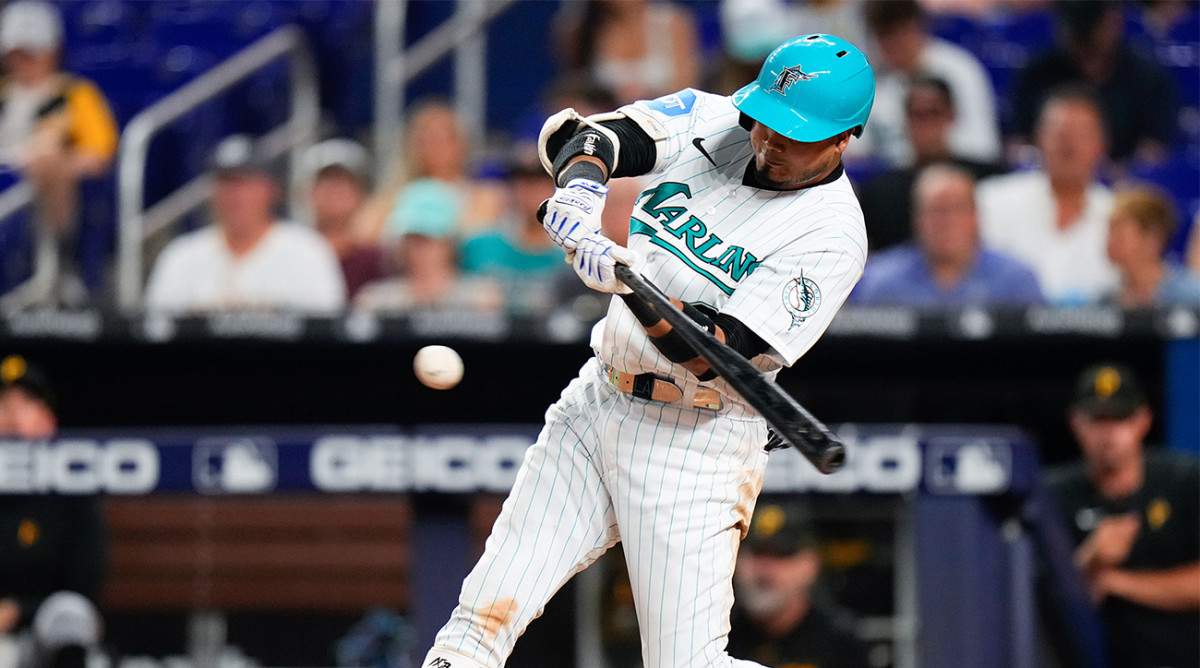Biggest Surprises From the First Half of the MLB Season
Four losing teams from last season are in playoff position this season.
The average game takes less time with more runs than anything seen in 70 years.
Chases for 62 home runs and a .400 batting average are in play.
Every baseball season is full of surprises, but this one, which kicked off with new game-changing rules, is the mother lode of surprises. Here are the 12 biggest surprises of the first half.
Watch MLB with fuboTV. Start your free trial today.

1. Shohei Ohtani is better than ever.
O.K., Ohtani is the most popular player worldwide, so how is this a surprise? Because of how much better he has become as a hitter. A career .267 hitter and .532 slugger entering this season, Ohtani is hitting .302 and slugging .663. Oh, and he also leads the league in triples. Only two players have hit .300, slugged .600 and led the league in triples: Willie Mays (1954, ’55) and Stan Musial (’48).
He is hitting the ball harder than ever (93.8-mph average exit velocity) and striking out less than ever (21.9%, below major league average for the first time). He has hit 32 home runs in the Angels’ first 91 games, one homer behind the pace of Aaron Judge last year.
Ohtani has grown into such an elite impact hitter that he would be MVP of the American League even if he didn’t pitch—but he does so and does it splendidly. The same dude who is the league’s best slugger is also the toughest pitcher to hit (6.01 hits per nine innings).
There are many head-spinning ways to measure why Ohtani is so amazing. Here is one of the better ones this year. Ohtani has hit 16 home runs that traveled at least 430 feet. That’s six more moon shots than anybody else in baseball, but also more than 23 of the 30 teams!
The kicker: on the mound, Ohtani has allowed zero home runs of 430 feet or more.
Ohtani has separated himself further from everybody else as the best player in the world. Just in time for free agency, if not the final 21 days of more Ohtani fantasy trade rumors. Angels owner Arte Moreno, even with his team slumping, prefers to hold Ohtani rather than deprive his fans of watching this incredible talent win a second MVP in an Angels uniform.
2. The pitch timer is an even bigger success than anticipated.
The pitch timer in the minor leagues last year cut 25 minutes off the average time of game. Even MLB did not anticipate quite that same effect in the majors this season. After all, the MLB pitch timer (15 seconds with bases empty, 20 with runners) allows more time than the one in the minors (14, 18).
But look what’s happened: The pitch timer has cut 26 minutes off the average MLB game. Baseball hasn’t been played this briskly (2:40) since 1984 (2:39).
But wait.
There are 8% more runs in the average game today (9.16) than in 1984 (8.51). Unless you were watching baseball 70 years ago, you’ve never seen so much run-scoring action packed inside games that average 160 minutes or less.
Most Runs Per Game, 2:40 or Less Average Game Time (Since 1947).
Year | Time of Game | Runs Per Game |
|---|---|---|
1950 | 2:21 | 9.70 |
1953 | 2:26 | 9.21 |
1949 | 2:19 | 9.21 |
2023 | 2:40 | 9.16 |
1948 | 2:15 | 9.16 |
Now that’s a huge boost in pace of action. Compared to last season (8.57 runs over 186 minutes), the pace of run scoring is up 19.5%!
And not coincidentally, attendance is up 9%.

3. Elly De La Cruz is a unicorn.
There has never been a player like De La Cruz. He is a 6'5" switch-hitting infielder (not a first baseman)—a baseball genius that has no precedent. He also is the fastest player in baseball.
In his first 30 games, De La Cruz racked up 16 stolen bases and 66 total bases. No other player has begun a career like that. And there’s this: The Reds are 22–8 with him in the lineup.
4. The Yankees have their worst offense since Horace Clarke was playing second base.
New York’s on-base percentage is .300, tied with Detroit for 26th in MLB. Only in 1907–08 and ’65–68—all before the mound was lowered—have the Yankees been worse at getting on base.
Yes, they miss Judge (and they are still unsure when he will return to the lineup). But with the new rules and more velocity, the Yankees picked a bad time to double down on age. Anthony Rizzo, 33; Aaron Hicks (before he was cut loose), 33; Kyle Higashioka, 33; Giancarlo Stanton, 33; DJ LeMahieu, 34; and Josh Donaldson, 37; all have struggled and Judge, 31, is hurt. No surprise, considering …
5. Age matters.
We are in the worst environment for older hitters since the mound was lowered.
Lowest On-Base Percentage, Ages 31–35 Since 1969
Year | OBP |
|---|---|
2022 | .311 |
2023 | .316 |
2012 | .316 |
2011 | .317 |
2013 | .318 |
Five MVPs and four Cy Young Award winners are on the IL, all in their 30s: Judge, 31; Mike Trout, 31; Robbie Ray, 31; Jose Altuve, 33; Clayton Kershaw, 35; Jacob deGrom, 35; Andrew McCutchen, 36; and Zack Greinke, 39.
Five of the seven oldest teams are out of playoff position: the Mets, Yankees, Padres, Rockies and Angels.
Meanwhile, almost all the best players are young. Twelve of the 13 players with the highest WAR this year are in their 20s. Mookie Betts is the oldest player on that list, and he’s just 30. Which brings us to ...

6. A new style of play is thriving.
Watch how Arizona plays baseball. It’s the new way forward. Teams with athleticism and speed are leveraging the new rules better than teams still playing by the risk-averse, analytics-based style (don’t take chances on the bases, pay for power, swing up on the ball in pursuit of homers, etc.). Old-school ways are thriving, bringing to the game a needed diversity of styles.
Here are the leaders in some “old school” revalued categories—with teams in playoff position in bold.
Most Stolen Bases
1. Reds
2. Rays
3. D-Backs
Most Extra Bases Taken
1. Rays
2. D-Backs
3. Braves
4. Reds
5. Orioles
Highest Batting Average
1. Rangers
2. Braves
3. Marlins
4. Red Sox
5. Nationals
6. Rays
7. Blue Jays
8. Phillies
9. D-Backs
10. Reds
This style based more on youth and athleticism (relatively cheap on the market) rather than established power (expensive) is turning the payroll-playoff relationship upside down.
Lowest Payrolls
1. A’s
2. Orioles
3. Rays
4. Pirates
5. Guardians
6. Reds
7. Royals
8. Nationals
9. Marlins
10. D-Backs
Highest Payrolls
1. Mets
2. Yankees
3. Padres
4. Phillies
5. Dodgers
6. Angels
7. Luis Arraez is chasing .400.
No, he won’t finish at .400, but how crazy is it that we are even having this conversation at the All-Star break? Nobody has hit even .380 in a full season since George Brett in 1980.
Arraez is hitting .383. In a season with an overall batting average of .248, it’s the equivalent of hitting .403 in 1941, when the MLB average was .262.
And check out how times have changed since Ted Williams hit .406 in 1941.
Hitter | Year | BA | Games | Pitchers Faced | Pitchers With Hits Against |
|---|---|---|---|---|---|
Ted Williams | 1941 | .262 | 143 | 74 | 58 |
Luis Arraez | 2023 | .248 | 86 | 148 | 91 |
8. Ryan O’Hearn can rake.
There may be no lower point for a major leaguer than getting DFA’d by the Royals. A team that is on pace to lose 116 games didn’t want O’Hearn, a career .219 hitter through age 28, even after they re-signed him last November. They booted him off the roster to sign Jordan Lyles (1–11), precipitating a trade to Baltimore.
The Orioles’ hitting coaches quickly fixed a flaw in his swing, getting him into a better posture when his front foot lands. Voilà! O’Hearn is slashing .302/.349/.518.
Other breakout hitters this season: Jack Suwinski of the Pirates, Luke Raley of the Rays, Lane Thomas of the Nationals, Mickey Moniak of the Angels and Ezequiel Duran of the Rangers.

9. The Marlins look like a playoff team.
Miami lost 93 games last year with an offense that ranked 28th in MLB in runs. This year it ranks 21st. So why does it have the third-best record in the league? The Marlins are 21–6 in one-run games. That is simply not sustainable.
No team has finished a season winning 77.8% of its one-run games, the way the Marlins are doing it. Since 1900, the best such record belongs to the 2016 Rangers at 76.6% (36–11). Of the five best teams at winning one-run games, four made the postseason (’16 Rangers, ’12 Orioles, 1970 Orioles and 1909 Pirates).
Of more importance is how Miami’s young pitching holds up in the second half. No team has received more innings and more starts from pitchers 25 and under than the Marlins. Finding established arms to gobble up innings should be a trade-market priority.
10. The Cardinals are bad.
The Mets, Padres, Yankees and White Sox are disappointments. But St. Louis is the biggest flop in baseball. After 15 straight winning seasons, the Cardinals are playing their worst baseball (.422) since 1924. They lack speed, defense and pitching. It’s time to blow up the roster, starting with pitchers on the last year of their deals (Jordan Montgomery, Jack Flaherty, Jordan Hicks) and exploring how to turn young position players (Tommy Edman, Nolan Gorman, Dylan Carlson, Jordan Walker) into frontline pitching the way Minnesota did in the Arraez-for–Pablo López swap.
11. The art of pitching still matters.
The best pitchers at limiting base runners all have below-average velocity fastballs, and all have changed teams in the past three years—but all know how to pitch.
MLB Leaders in WHIP | How Acquired | 4-Seam Velo |
|---|---|---|
1. Tyler Wells, Orioles | 2020 Rule 5 pick from Minnesota | 92.5 |
2. Joe Ryan, Twins | 2021 trade from Rays | 92.5 |
3. Zach Eflin, Rays | 2022–23 free agent | 93.0 |
12. High-priced free-agent box score: 0-for-12.
A dozen free agents signed contracts last winter worth more than $75 million. None of them will play in the All-Star Game. Two were selected but are hurt (Judge and Dansby Swanson). The other 10 are either hurt and/or were found undeserving (Trea Turner, Xander Bogaerts, Carlos Correa, deGrom, Carlos Rodón, Brandon Nimmo, Edwin Díaz, Willson Contreras, Justin Verlander, Andrew Benintendi).
